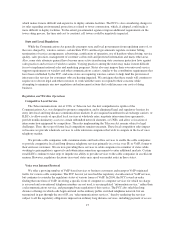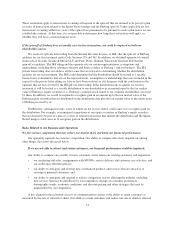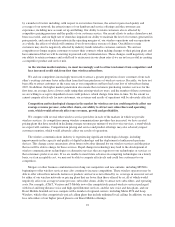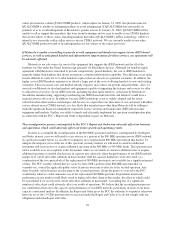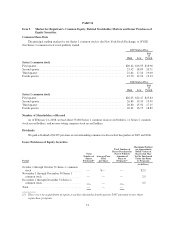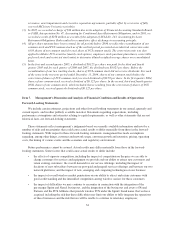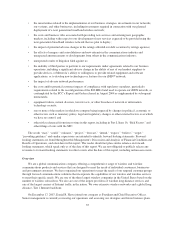Sprint - Nextel 2007 Annual Report Download - page 27
Download and view the complete annual report
Please find page 27 of the 2007 Sprint - Nextel annual report below. You can navigate through the pages in the report by either clicking on the pages listed below, or by using the keyword search tool below to find specific information within the annual report.Our credit facilities require that we maintain a ratio of total indebtedness to trailing four quarters earnings
before interest, taxes, depreciation and amortization and other non-cash gains or losses, such as goodwill
impairment charges, of no more than 3.5 to 1.0, which as of December 31, 2007, was 2.5 to 1.0. If we do not
continue to satisfy this ratio, either because we do not generate sufficient cash from operations or otherwise, we
will be in default under our credit facilities, which could trigger defaults under our other debt obligations, which
in turn could result in the maturities of certain debt obligations being accelerated.
If we are unable to improve our results of operations, we face the possibility of additional charges against
earnings for impairments of goodwill and other assets.
In connection with our annual assessment for impairment of goodwill and other long lived assets, we
reduced the goodwill and consolidated shareholders’ equity by $29.7 billion in the fourth quarter 2007. As part of
this annual assessment, we updated the forecasted cash flows of our wireless reporting unit. If we are unable to
improve our results of operations and cash flows, or other indicators of impairment exist, such as a sustained
significant decline in our share price and market capitalization, we may incur another, material charge against
earnings relating to our remaining goodwill.
In addition, we review our wireless and wireline long lived assets for impairment whenever changes in
circumstances indicate that the carrying amount may not be recoverable. If we are unable to improve our results
of operations and cash flows, such a review could lead to a material impairment charge in our consolidated
financial statements.
We have entered into outsourcing agreements related to certain business operations. Any difficulties
experienced in these arrangements could result in additional expense, loss of customers and revenue,
interruption of our services or a delay in the roll-out of new technology.
We have entered into outsourcing agreements for the development and maintenance of certain software
systems necessary for the operation of our business. We have also entered into agreements with third parties to
provide customer service and related support to our wireless subscribers and outsourced many aspects of our
customer care and billing functions to third parties. We also have entered into an agreement whereby a third
party has leased or operates a significant number of our communications towers, and we sublease space on these
towers. As a result, we must rely on third parties to perform certain of our operations and, in certain
circumstances, interface with our customers. If these third parties are unable to perform to our requirements, we
would have to pursue alternative strategies to provide these services and that could result in delays, interruptions,
additional expenses and loss of customers.
The intellectual property rights utilized by us and our suppliers and service providers may infringe on
intellectual property rights owned by others.
Some of our products and services use intellectual property that we own. We also purchase products from
suppliers, including handset device suppliers, and outsource services to service providers, including billing and
customer care functions, that incorporate or utilize intellectual property. We and some of our suppliers and
service providers have received, and may receive in the future, assertions and claims from third parties that the
products or software utilized by us or our suppliers and service providers infringe on the patents or other
intellectual property rights of these third parties. These claims could require us or an infringing supplier or
service provider to cease certain activities or to cease selling the relevant products and services. Such claims and
assertions also could subject us to costly litigation and significant liabilities for damages or royalty payments, or
require us to cease certain activities or to cease selling certain products and services.
All suppliers of our CDMA handsets license intellectual property from QUALCOMM. Some of this
QUALCOMM intellectual property has been found to infringe on certain patents owned by Broadcom Corporation.
The International Trade Commission has found that QUALCOMM infringes certain of Broadcom’s intellectual
property, and a United States district court recently enjoined QUALCOMM from further infringement of other
patents and from certain other activities. Although that injunction is effective immediately, the ruling contains a
25


